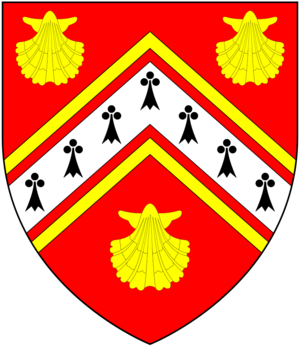Brutus Browne facts for kids
Brutus Browne (born by 1564, died 1595) was an English naval officer. He came from a place called Brown's Hillash in Langtree, Devon. Brutus Browne is famous for fighting against the mighty Spanish Armada in 1588. He was also a Member of Parliament (MP) for Bodmin, Cornwall, from 1586 to 1587.
Contents
Who Was Brutus Browne?
Brutus Browne was the second son of Thomas Browne (who died in 1596). His father, Thomas, was an important official. He worked for the Duchy of Cornwall, which manages land and property for the British royal family. Brutus's mother was Joane Lene.
Brutus had a younger brother named Sir Thomas Browne (who died in 1614). Sir Thomas was made a knight in 1603. He built a large house and a deer park at Brown's Hillash. Sir Thomas did not have any children. After he died, the family's lands were shared among the female relatives.
Brutus Browne's Career
Brutus Browne had two main roles in his life: a politician and a naval officer.
Becoming a Member of Parliament
Brutus Browne became a Member of Parliament (MP) for Bodmin in Cornwall. This was likely because his father had a lot of influence. His father's job with the Duchy of Cornwall probably helped Brutus get this important position.
Brutus Browne was a brave officer in the Royal Navy. He played a part in the famous battle against the Spanish Armada in 1588. He served on a large sailing ship called the Rainbow. The ship was commanded by Lord Henry Seymour.
In 1595, Brutus Browne joined an expedition led by two famous explorers, Sir Francis Drake and Sir John Hawkins. Brutus invested a lot of money in this trip, hoping to capture a Spanish treasure ship. They believed the ship was waiting in Puerto Rico.
However, the Spanish found out about their plan. They were ready when the Rainbow and the English fleet arrived in Puerto Rico in November 1595. Spanish cannons on shore fired at the English ships. A cannonball hit the Defiance, where Sir Francis Drake and his officers, including Brutus Browne, were having a meal.
Sir Francis Drake was not hurt, but Brutus Browne and another officer, Sir Nicholas Clifford, were badly wounded. Brutus Browne wrote his will on the Defiance on November 19, 1595. He said he didn't mind if his body was buried on land or at sea. He gave a diamond ring to Sir Francis Drake. He called Drake his "honourable and most kind good friend." He wanted the ring to show his honest love and wished Drake success on his journey. Brutus Browne likely died soon after this, and he never married.
 | Stephanie Wilson |
 | Charles Bolden |
 | Ronald McNair |
 | Frederick D. Gregory |


